Essential Oils and Sleep: How to Heal Your Sleep Cycle Naturally
Essential oils have become a mainstay in the modern world as a means of improving overall health. One of the most common ways to use essential oils is by diffusing them into the air. This allows the oils to be absorbed through the lungs, which can provide a host of benefits, including improved sleep.
Essential Oils and Sleep: Why Are People Not Getting The Sleep They Need?
We all know that getting a good night’s sleep is important for our health, but many of us are not getting the rest we need. There are many reasons why people have trouble sleeping, including stress, anxiety, and noise levels. But one of the main reasons people have difficulty sleeping is because they are not getting the right type of sleep.
Most people think that sleep is just a matter of turning off the lights and going to bed, but sleep is a complex process that involves several different stages. Most people only achieve two or three of these stages during an average night’s sleep, which can lead to problems such as difficulty falling asleep, restless sleep, and poor sleep quality.
The good news is that there are several things you can do to improve your sleep cycle and get the rest you need. One of the best ways to improve your sleep is by using essential oils. Essential oils have been shown to be extremely effective at promoting relaxation and helping people fall asleep.
Organic Aromas spoke to a group of sleep and aromatherapy experts so that we can hack our way into deep slumber naturally.
Adora Winquist

Since 1990, Adora Winquist has been a visionary in the nascent field of Quantum Alchemy and a pioneer in the field of vibrational medicine and aromatherapeutic healing.
She is known for establishing one of the first brands to combine aromatherapy and energy healing on a national scale, evolving it into a world-renowned, award-winning company.
She is the co-author of “Detox, Nourish, Activate: Plant and Vibrational Medicine for Energy, Mood, and Love.” This revolutionary book guides readers along the path of self-mastery and the ultimate expression of their personal truth.
Among a full collection of products and services, she offers facilitation, education, and guided ceremony/meditation, along with custom vibrational medicine/aromatherapy blends at AdoraWinquist.com. When she isn’t supporting others on their healing journey, Adora can be found spending time with her alpha-male counterpart and two young daughters.
Organic Aromas: Give us a brief history of your expertise where sleep matters are concerned.
Adora: Over the past two decades I have worked with thousands of customers and clients in the field of alternative medicine and in particular aromatherapy, to have better quality relaxation and sleep. These two aspects of wellness go hand in hand. Our ability to be able to relax our body, mind and spirit are intrinsic to good quality sleep which is in turn a healthy nervous system response to stress and our ability to drift off into deep, restorative rest phases of sleep.
I created one of the first national aromatherapy brands to address mood and wellness and my current brand and formulations include the first nano particle essential oil formulas for sleep: another innovation in the field of aromatherapy. My latest book Detox Nourish Activate: Plant & Vibrational Medicine for Energy, Mood and Love focuses on aspects of self-care in the healing process and how the brain and nervous system regulate our ability to rest and repose. The book is filled with interventions and DIY formulas like the one below:
Soothing Lavender Sleep Spray
• 11 drops Lavender essential oil (Lavandula angustifolia)
• 2 drops Mandarin essential oil (Citrus reticulata)
• 1 drop German Chamomile essential oil (Matricaria recutita)
• 2 drops Geranium essential oil (Pelargonium graveolens)
Blend into 30 ml of distilled water and shake well before use. Mist bed-
room and pillows before retiring for a restful night’s sleep.
Excerpt from Detox Nourish Activate: Plant & Vibrational Medicine for Energy, Mood & Love by Adora Winquist and Lulu Shimek, ND
What causes sleep disorders like insomnia?
Many factors contribute to sleep disorders like insomnia. Typically associated with the nervous system, insomnia can arise from stress, Post Traumatic Stress Disorder (PTSD), hormonal imbalances, anxiety and depression. Adrenal fatigue or adrenal burnout as it is often referenced, can also contribute to sleep disruptions.
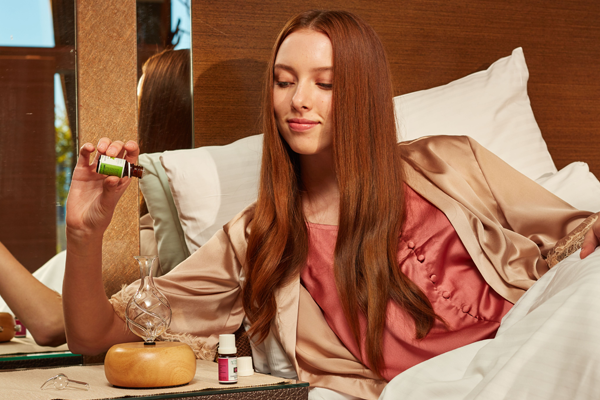
Can aromatherapy help people sleep better?
The right essential oils (quality as well as variety) in the correct formulation have the ability to literally shift our mood, our thoughts, our conscious awareness, and therefore our overall physiological response. This makes essential oils perhaps one of the most effective ways to encourage and enhance sleep, balance stress response and address nervous system imbalances including insomnia.
Biochemically active, essential oils contain sometimes hundreds of chemical constituents that contribute to their aromatic profile as well as their physiological benefits. For example, one of the main chemical constituents of Lavender, linalool, contributes to the nervine nature of this tremendously versatile and calming oil. From an alchemical perspective, aromatics represent the spirit, or the “quintessence” of the plant. Their energetic nature offers us a profound ability to open, access, and actualize our highest nature and potential for a vibrant life rich in all facets of health and harmony.
Please explain to us why essential oils work
Essential oils work in a multitude of ways, but the most immediate and sustainable way is inhalation. This is because of the proximity of the nose to the brain, specifically the limbic system, which regulates so much of our physiology including mood, memory and emotion and nervous system regulation.
Uniquely, in part due to their molecular size, essential oils pass through the blood-brain barrier, providing important phyto-nutrients throughout our body. This aspect, along with their vibrational nature, allow us to absorb the chemical components and balance our brain-body chemistry. This brings healing to the nervous system to reset, re-regulate and balance our overall physiology including our ability to sleep deeply and restoratively.
Essential oils are also absorbed through the dermal layer of the skin. There are numerous variables in timing and absorption rates that are individual, environmental and plant specific. Have you ever peeled a clove of garlic and rubbed it on the sole of your foot? About a minute or so later, you can actually taste it on your breath. This is the power of the essential oils absorbing through your bloodstream. I love to use essential oils in the mind-body practice of tapping on meridian points to clear and balance our calm and center emotions. We are longing for deeper contact, now more than ever.
Massage synergizes touch and aromatics to enhance our connection with ourselves through communion with another. This releases healthy brain chemicals, like oxytocin. This is imperative for optimizing our brain chemistry and mind-body vitality.
Rest & Restore Massage Oil
• 3 drops Roman chamomile essential oil (Chamaemelum nobile)
• 5 drops Geranium essential oil (Pelargonium graveolens)
• 6 drops Lavender essential oil (Lavandula angustifolia)
Blend into a 30 ml bottle of your favorite carrier.
From a vibrational and energetic perspective, essential oils assist us in opening our auric field, chakras, and meridian points for clearing, balancing and expansion of self-awareness. They become an anchor for our intentions and a means for us to come to a greater understanding of the limitless potential of human nature and the grand importance of self-love and compassion through self-care.
These oils encourage us to embrace the sacredness of the earth beneath our feet and the divine consciousness that surrounds us in benevolence in each and every moment. Essential oils gently awaken the ancient wisdom within our spirits, encouraging us to claim our greatness.
What are the best essential oils for sleep in your experience?
Lavender (Lavandula angustifolia): Relaxing and restorative, beneficial for anxiousness and sleep.
Patchouli (Pogostemon cablin): Grounding and calming, beneficial for anxiousness and scattered thinking.
Geranium (Pelargonium graveolens): Centering and uplifting, beneficial for acne, anxiousness, hormonal and emotional balance.
Roman chamomile (Chamaemelum nobile): Soothing and comforting, beneficial to balance stress, insomnia
Frankincense (Boswellia carterii): Tranquil and balancing, beneficial to deepen breath and oxygenates the cells, good for insomnia and relaxation.
Talk to us about essential oil safety and what people should avoid
In terms of safety, just because something is natural, doesn’t always mean it is safe. Context is key. Safety in usage and blending is a voluminous topic. Here are a few key points:
Standard considerations: Keep out of reach of children and pets. Consult a trained practitioner before using with children under 3, if pregnant, or under the care of a physician for epilepsy. Do not use oils internally. Dilute with a carrier oil for use on the skin. Do your research. Check to see what oils may be skin irritants. Do not use citrus oils topically before sun exposure. In this form of plant medicine, less is, more often than not, best. Store your oils in a cool, dark area.
Give us your final remarks on essential oil and sleep
Two of my favorite practices for rest and sleep using essential oils are hydrotherapy and meditation. The warm water increases the skin absorption of the essential oils. Adding epsoms salt provides another element of soothing and restoration. To avoid potential skin irritation, blend the oils in coconut oil or other carrier before adding to the bath. Generally speaking, 7-10 drops of an essential oil or synergy is effective for your aromatic bath.
Sleepytime Hydrotherapy
• 3 drops Lavender essential oil (Lavandula angustifolia)
• 4 drops Geranium essential oil (Pelargonium graveolens)
• 2 drops of Roman chamomile essential oil (Chamaemelum nobile)
Blend essential oils in a carrier, add 3 cups of epsom salts and soak for at least 20 minutes.
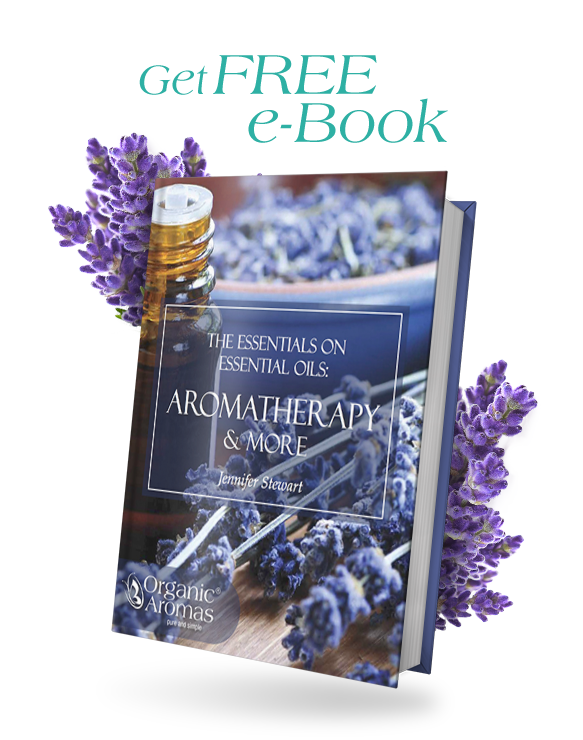
Sign Up to Get Your FREE
e-Book Here…
Alex Savy

Alex is a Certified Sleep Science Coach and the Founder of SleepingOcean.com. Helping people to improve their sleep is one of his key goals at SleepingOcean. Alex has been featured on The New York Times, Healthline, WeddingWire, NewsBreak and more.
“The reason why certain essential oils may affect one’s sleep quality is that the chemicals released by natural oils can stimulate the amygdala. This brain part plays a role in emotions and certain behaviors. By affecting this section of the brain, people can also influence some physiological functions, including blood pressure and heart rate.
Sleep-inducing essential oils can help lower the heart rate. This typically promotes relaxation and can help people fall asleep faster and enjoy deeper, more restorative rest.
The most effective essential oils for sleep are lavender, chamomile, bergamot, sandalwood, sage, ylang-ylang, peppermint, and marjoram. However, many of them have a strong, distinct scent that may seem too distracting for some sleepers. That’s why my personal favorite is chamomile. This essential oil has a subtle scent but can have a significant soothing effect. It works especially well when used with an aroma diffuser.”
Marisa Tolsma

Marisa is a certified GAPS™ Diet coach and founder of Bumblebee Apothecary at bumblebeeapothecary.com. Reversing chronic health issues with diet and aromatherapy changed my life, and now I help busy people make natural living doable and fun.
“For me personally, essential oils are an important part of my relaxation and sleep routine. My favorites are lavender, chamomile, and copaiba. If I ever have trouble falling asleep, applying a blend of these oils diluted in fractionated coconut oil helps put my mind at rest and allows me to fall asleep quickly.”
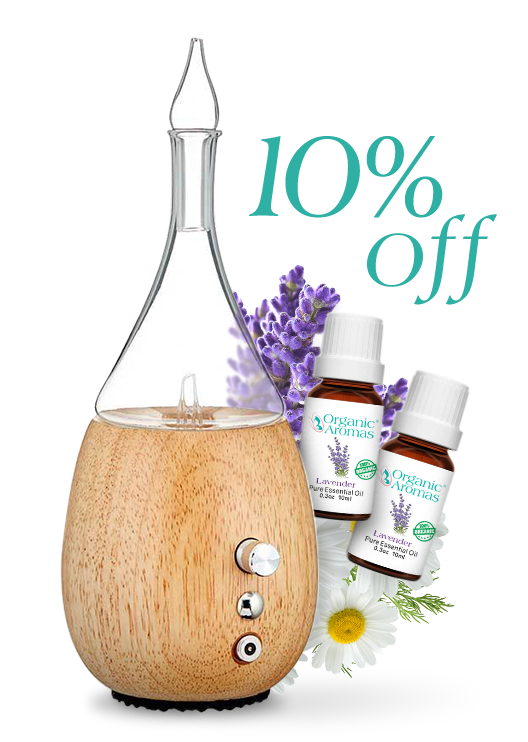
Join Now and Get a Coupon for 10% Off!
Mark Kohoot

Mark founded Aeroscena in 2010 with the mission of advancing aromatherapy via the use of scientific research and rigorous testing for use in clinical settings. Over the past decade, Mark has grown the company from the kernel of an idea – the result of his work with Dr. Michael Roizen, Chief Wellness Officer at the Cleveland Clinic and current medical advisor to the company – to a leading force in the adoption of evidence-based aromatherapy within the healthcare community. Today, Mark is focused on scaling up Aeroscena’s impact on wellness through partnerships with industry leaders that will allow the company’s deep understanding of the science of scent™ to be brought to a much larger audience. They sell almost exclusively to hospitals and clinicians.
“Essential oils like lavender and others can have a consequential impact on insomnia. Know and trust your supplier. Diffuse the oils just a few minutes before you want to sleep, since the brain begins to ignore fragrance signals after only 5 minutes or so. Therefore, your diffuser should have an intermittent setting. If it runs for 10 minutes and rests for 20, that is an ideal interval for not only helping to keep the biochemistry on the sleep track, but it will also permit sleeping through the night. Without this timing, it’s easy to wake up in a few hours and must start the process again.”
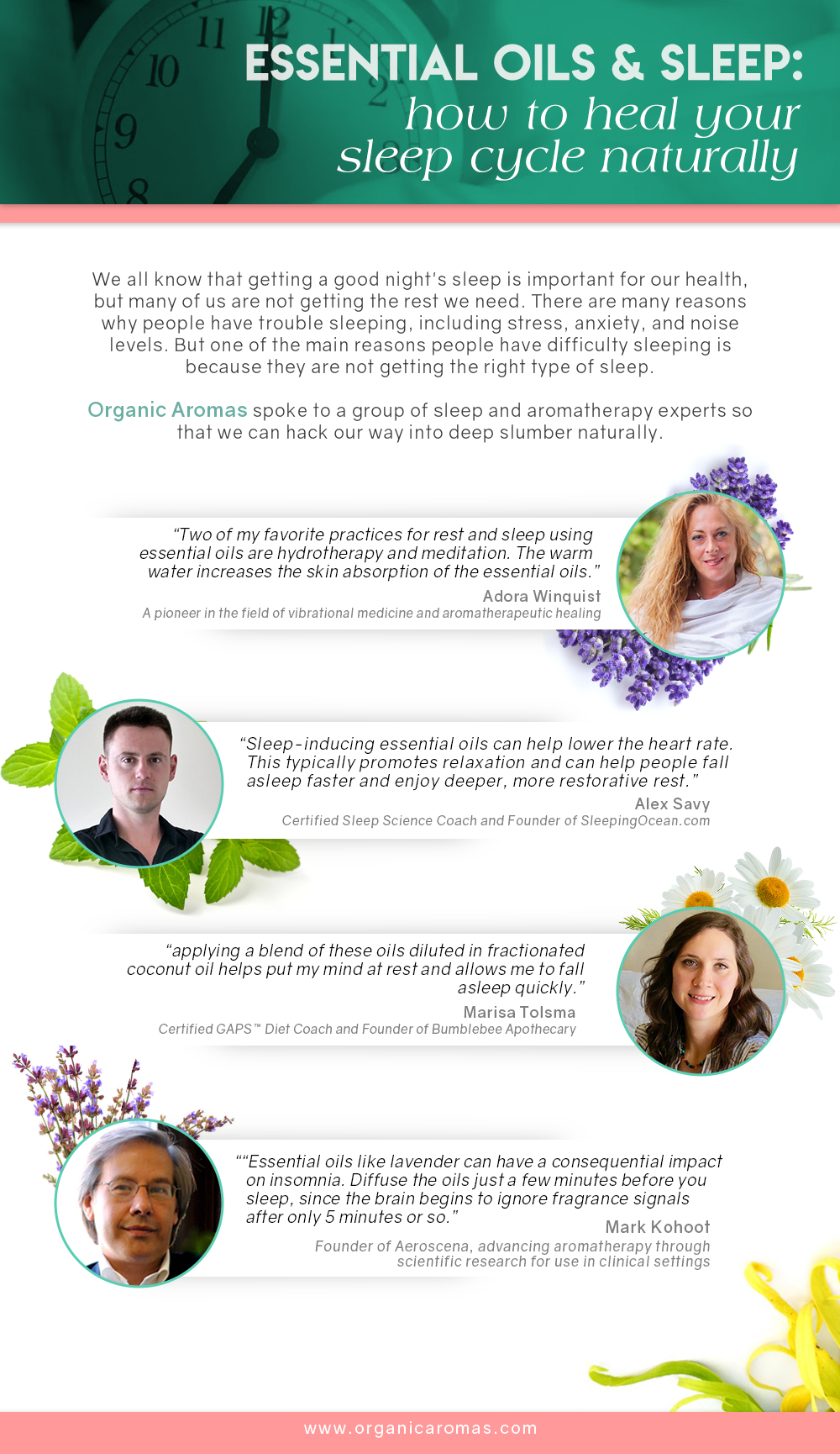
Organic Aromas Essential Oils and Sleep Survey
To find out whether people are using essential oil for their sleep issues, Organic Aromas conducted a survey targeting adult men and women in the United States. The survey results were interesting.
54% of the people polled stated that they used essential oils to relieve stress, anxiety and depression that interferes with their sleep cycle. In the survey, the most popular essential oil was lavender.
Other popular oils for improved sleep were chamomile, marjoram, and peppermint. 69% of respondents stated that essential oils improved their sleep cycle significantly helping them sleep better.
A whopping 77% of people we surveyed said that they would recommend the use of essential oils for sleep to their friends. Below is a graphical representation of our survey:
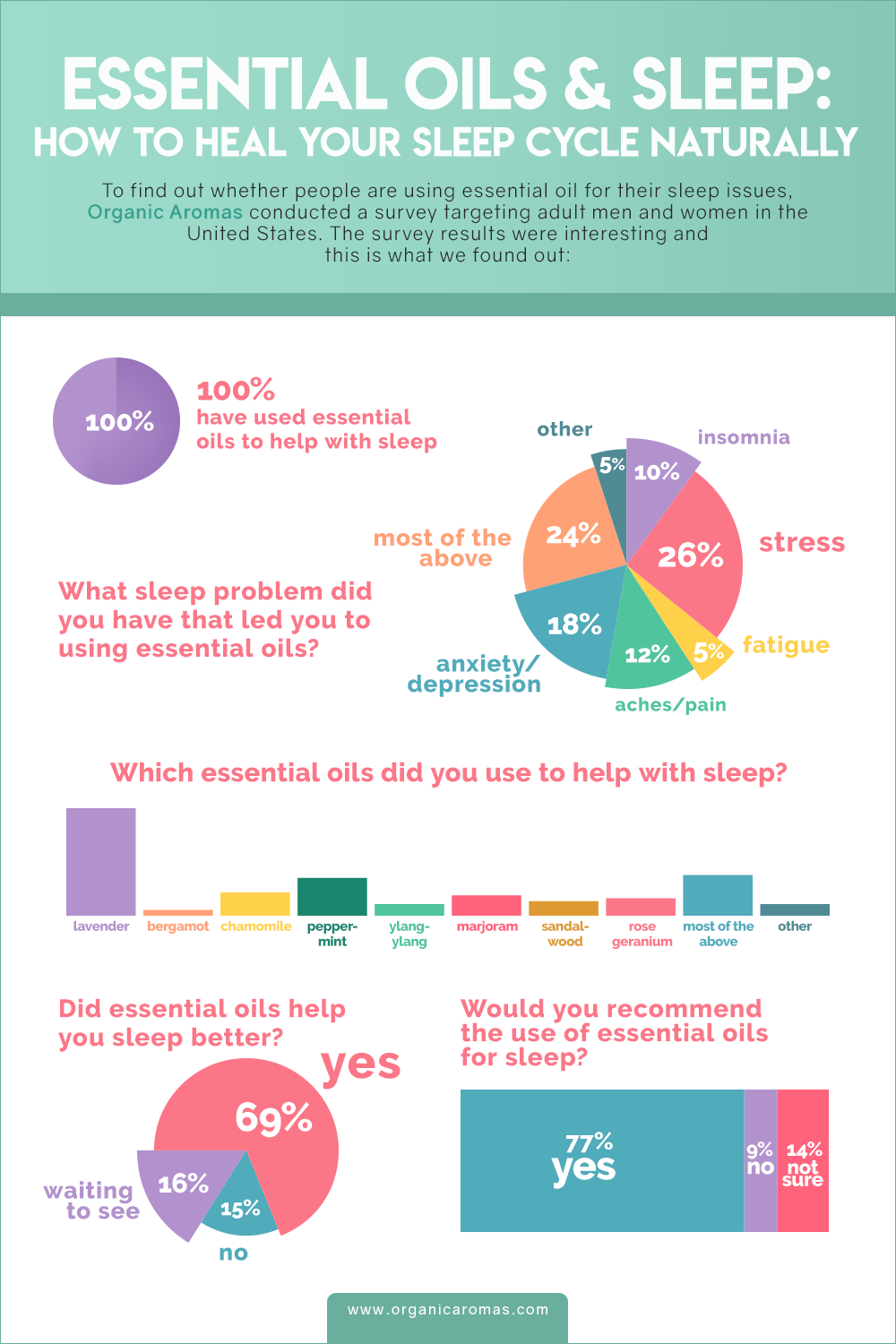
If you found this reading interesting and wish to learn more, check out our in-depth article on essential oils for snoring.
Final Thoughts
A poor sleep cycle is known to cause numerous health problems. Not only does it affect our physical health, but our mental health as well. It’s important to get a good night’s sleep so that we can function at our best the next day. Essential oils heal the sleep cycle naturally so that you can get the best sleep possible. In the words of Thomas Dekker, sleep is that golden chain that ties health and our bodies together.
Frequently Asked Questions (FAQs)
What essential oils help with sleep?
Lavender, chamomile, and bergamot are popular for their calming and soothing properties. Lavender is especially well-regarded for improving sleep quality by increasing the time spent in deep sleep.
How to use essential oils for better sleep?
You can use essential oils for sleep by diffusing them in your bedroom about 30 minutes before bedtime, applying diluted oils to pulse points, or adding a few drops to a warm bath before bed.
Can essential oils improve deep sleep?
Yes, some essential oils, particularly lavender, have been shown to enhance deep sleep by reducing stress and anxiety levels, creating a more conducive environment for entering deeper sleep stages.
Are essential oils safe for children’s sleep?
Some essential oils are safe for children, but they must be used with caution. Lavender and chamomile are generally safe when diluted. Always consult with a healthcare provider before using essential oils on or around children.
What are the best essential oil blends for insomnia?
A blend of lavender, cedarwood, and frankincense can be effective for insomnia. These oils help reduce stress and anxiety, which can interfere with sleep.

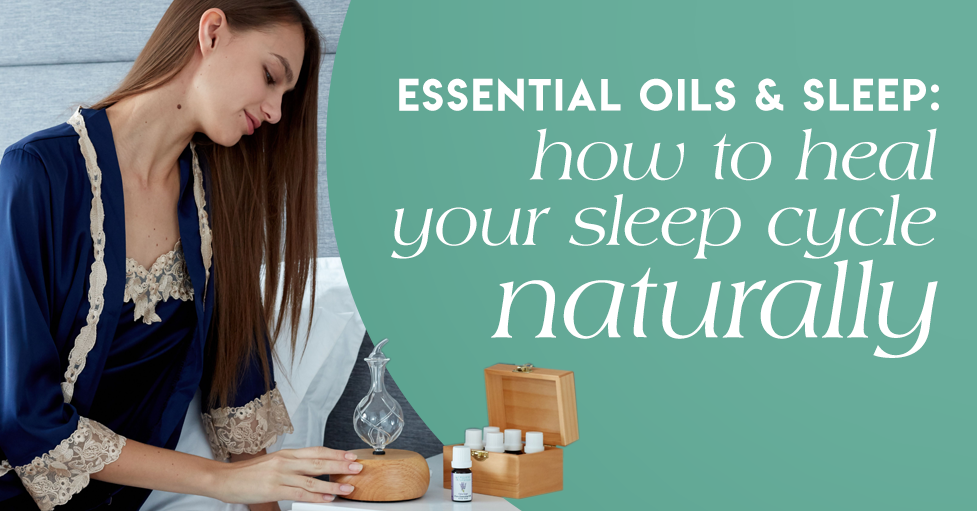

It’s always good to get good sleep!
Everyone needs a good night’s sleep!
I will try this to see if it works
Thank you for the post. I might give some of these tips a shot!
Great
well done love it! thank you for all the information
Aromatherapy seems to be a low-risk low cost way to help with the sleep issues most of my family has…
thanks for the info
This hits home for me big time! I suffer from insomnia for most of the reasons given. I found all of this very interesting and informative. I will have to try essential oils to see if it can help my sleepless nights.
definitely something I have been looking more into lately. just cant seem to get adequate sleep most nights
I have frequently been experiencing disruptive sleep since Covid hit. Any info I can take in about how to sleep better in these rough times is greatly appreciated.
Thanks for the helping pur sleep!
best of luck to everyone in the giveaway!
Thanks. I’ve had insomnia for years
This was so informative! Thank you for sharing!
Thanks for the advice. having insomnia lately
Great read ! I love me some essential oils smells, especially lavender!
I’ve had sleep problems for a long time. I will definitely try essential oils and see if it helps me.
🔥🔥🔥
Been using lavender for a while now and can definitely recommend
Sound wonderful, I love lavender especially!
Thanks for the great ideas and info. I need to learn more about aromatherapy and oils.
I love essential oils. can’t get enough of them.
Thanks for the great tips. I have terrible sleeping patterns so this might help.
I love aromatherapy and usually mix up my own scents or use them in the bath but I am afraid to use any in my diffuser because I read that the oils can be very harmful to cats.
Very helpful
Excellent article this sounds fabulous and very informative, home it helps with sleep for me
This post was very informative. Essential oils sound like a great way to improve sleep.
As someone that regularly sleeps 4-5 hours a day this looks helpful
Thanks for such a calming lovely read
I have been using essential oils for years. They smell good and have so many other benefits.
Lavender is a comfy smell for me 🙂
I HATE, DETEST, and DESPISE the smell of lavender.
Must try this
Thanks for this article I have had problems sleeping since ever. This will hopefully help.
Interesting read ! I have to look into getting some essential oils especially lavender
I need to try this because after having a hysterectomy I can’t sleep without a sleeping pill
Really helpful, thank you!
Great post!
I agree this is true
Really helpful article!
Absolutely love lavender it’s my favourite always fall asleep when iv had a bath with small amount in and a spray on my pillow
Great post!
Love essential oils! Lavender is always my fave!
Mine too!
I’ve been using Lavender to help my daughter sleep for years!
Cool.
Thanks for a great blog about essentials oils, I learned lots about sleep
Thanks for the information. I have a lemon chamomile essential oil that I find refreshing and soothing.
So much great info!!!! Thank youuu
So relaxing
Been having ongoing trouble sleeping actualy, may look into essential oils to see if they might help mel
I really like the blog.
I have several health issues that make sleep difficult some nights. I am looking for natural ways to help me sleep. I love the scent of lavender.
We use an air diffuser at night in our bedroom and add 4 drops of essential oils to the water. We co-sleep with our two toddlers and find it really helps them sleep at night too!
Would like to try these to help me sleep better at night.
Thank you for creating this blog and the importance of sleep.
I might try these if I didn’t have allergies.
Found out there are other oils than lavender for sleep.
Thank You will have to give this a try
I have the hardest time going to sleep I will look into these oils, maybe it will help me to sleep. Thank you for such great info
Great information! Always looking for tips on how to achieve a better night’s sleep.
I have not tried but need to as they look like they work.
Just learned something new about essential oils and sleep! Thanks!
I’m a new customer and I’m loving everything so far. I absolutely LOVE Dream on!
I already use some essential oils for cleaning and skincare – time to try some to see if I can improve my sleep, thanks!
I would love to try these for my husband who recently had a lung transplant. I will be asking his team if he’s allowed!
So much useful information here. I have a hard time falling asleep. Thank you for posting!
I love when we can use essential oils for aromatherapy in the hospital. It truly does make a difference.
I usually have no trouble getting to sleep but I wake up 4-8 times during the night. I wonder if this would help me stay asleep.
I need to look into using these.
I love learning what will give me a better nights sleep and thanks for the information .
Interesting
Thank you for the info
I like to use Lavender essential oils to calm me down and get relaxed for sleep.
Thanks for sharing this information. I am new to using essential oil.s
Thank you for all the information
Very interesting information. I appreciate it.
So many great new concepts for me. I am trying to learn all I can, and this was such an amazing read. Thank you!
Lavender oil has been my go to oil for decades for calm and sleep.
Nice post. Great information. Thanks!
I love essential oils thank you for the info!
Well thought out informative article
Very interesting, thanks!
Thank you for this great information. Will try the Rest & Restore Massage Oil recipe
I’ll try anything to get a good night’s sleep, it’s been years!!
I love the idea of oils for anything. I’m allergic to chamomille so none of these work for me.
Wow, I learned something new about essential oils and sleep!
I have only tried roll-on oils, would love to create a spray version
I will have to try these. I need all the help I can get.
I knew about lavender, but I am not a super fan of the smell. Glad to see there are others that help with sleep
articolo utile e interessante.
cover yourself in oil
I need to try this, would try different combinations to get the right relaxing one.
ha
Useful information, I love using essential oils and really like a mixture of lavender and patchouli.
My personal favorite combination for sleeping essential oils would be lavender essential oil geranium essential oil Ylang Ylang essential oil mixed with a tiny bit of Bergamont and Frankincense
I need to buy some chamomile oil and try it.
So interesting.
This article has been very helpful. It is helping people find out what is natural and healthy. I really enjoyed it.
Perfect timing! Thanks for the great reminder. Just what I needed.
I should give this a try!
I used these wins I was in Cosmetology School. I have a chart that tells you what each oil is used for. I really need to start using again. Thank you for sharing.
Thank you for this post. It’s quite helpful, as I’m finding my sleep becomes more broken as I become older.
Very helpful informative
Did not know all this about Colloidal Silver. Great information.
Great ideas and product
Loving this article! My mom introduced this to me for my troubled daughter. The oils work
Great article. Quite informative and helpful. Thanks!
I would love to try this as I have a hard time falling to sleep
Hope it helps me sleep!
I wonder if these would help me sleep better!
I like your perspective in analyzing the effects of aromatherapy.
Lavender is my go to along with making sure my room is cool and dark (no devices). Oddly enuf noise does not mess with my sleep routine.
I am just starting to use essential oils for my headaches and migraines and they are proving to be a big help. Lavender is quite strong, so I hope to try Chamomile oil on my pillow in the near future to see if it will relax me and help me get to sleep.
So much great information
good info
Very good tips that could help my insomnia.
I have found aromatherapy very helpful for sleep issues.
more information to learn
Yes I’ve heard about using lavender for sleep Zzzzzzzzzz
Wow! You have really researched this topic. Thank you.
Wow, thank you for this post
So helpful!
This helps me understand my sleep disturbances better
Thanks for the great information. I really need to get some!
Thanks for this educational article and I love all the great recipes and ideas to get a better sleep.
This is an idea I may have to try.
lots of helpful information
always disliked using medication. so much that could go wrong!
Great way to improve sleep!
I always loved the smell of lavender essential oil.
interesting read, thanks for the info
I have heard about essential oils and benefits from some friends. I believe I will be giving it a go.
I was aware of lavender, but did not realize there were so many other essential oils that provided the same benefits.
We always use essential oil for a great sleep. The trick is to use very little.
interesting info
I’m having some trouble getting proper sleep. Going to try some of these recipes with an open mind and hopes that they will help.
I could certainly use some healing for my sleep cycle, so I’ll have to try some of these recipes!
Great practical info. Sometimes I get insomnia so this info will come in handy for sure. Thanks for the recipes.
Interesting and new information. Thanks!
I love the idea of a roll-on bottle of essential oil. As someone who doesn’t have a bathtub any longer, applying these oils to help sleep would be great.
Really very interesting
Great and abundant information on essential oils, which is something I need for therapy.
I’m fascinated by the variety of “recipes” for aromatherapy that enhances sleep. I’d love to try more than I already have.
A few years ago my mom was battling cancer. I was so sick about it that I couldn’t sleep. I finally saw my doctor who suggested that I should sleep with a teddy bear infused with a few drops of lavender essential oil. I was shocked by the advice since I was a grown woman over 50. However, I decided to try it and I fell asleep that night and every night after within 15 minutes. Lavender essential oil is a blessing for those who can’t sleep.
This is such a help. Thank you so much!
Thank you for the article. Very informative!
Thanks for the helpful information! Essential Oils are a must for me!
I’ve been having trouble sleeping so this should help
Thank you for the recipes for the Soothing Sleep Spray and Rest & Restore Massage Oil! They sound gorgeous, can’t wait to try them.
Aromatherapy is one of my go-to cures for insomnia. Great article.
This is pretty interesting. Sounds like a good bit of helpful info!
I definitely coud use better sleep
I already use lavender, thanks for the additional oils!
I’d love to try these for my troubles with sleeping. Thank you for sharing this.
I so need this.
Thank you for all of this information
Never thought of combining lavender, chamomile, and copaiba. Will have to try that.
Thanks for the info
Awesome items!
I have been having trouble sleeping lately so I am for sure going to turn to essential oils to help me relax and sleep better.
Very informative!
I had no idea that oils could have such a powerful effect on sleep
I’ve used essential oils like Lavender to help with sleep before but I’ve never tried Geranium or Patchouli! Need to give it a go 🙂
Very tired now
Thanks for sharing this information and the different recipes for getting a good sleep!
This is much needed information for me. Thank you for sharing.
I will have to try lavender!
Thanks for the great details on essential oils, really helpful!
Wonderful article. I will look into somewhere I can get the best oils
I have a buckwheat eye pillow that I use with lavender
As someone who frequently has trouble sleeping, I really need to try the ideas here!
Essential oils are great!!
awesome info!
I love patchouli
Lavender is great for sleep. A few drops on the pillow always helps me relax.
Would love to try these out. I love patchouli
I would love to try these!
I had no idea that essential oils are also absorbed through the dermal layer of the skin.
Thank you for the very informative article .
lots of helpful information
I love smelling lavender. It calms me.
I rarely have sleep problems but this is great to know about, thanks
Peppermint oil is the best for sleep!
I can always use help sleeping!
Never have sleep problems, but good to know
i have wonder how to use Essential Oils
I love the scent of lavender.
Thanks for all the great information. I love lavender and chamomile.
Thanks!
Thanks for the article. I have been struggling to sleep through the night.
I love natural products that work!
I am find as I age, I am having a harder time sleeping. I would like to try the lavender sleep spray to see if this helps.
So much better to use nature rather than pharmaceuticals that have side effects.
Lots of useful information – thanks!
Wow this was so very interesting. Thank you for all the amazing tips!!
Very helpful info. I will try some of these.
Very helpful info. I will try some of these recipes!
This is the information I 100% need! Thank you so much!
💜💛🧡❤️
Thanks for the info!
Awesome!
I’m a single mom of two young daughters and I had a heart attack 8 months ago. I’m going to try these great oils and see if better sleep helps my heart.
This sounds worth trying. Thanks for the info
Great blog post! Thanks
Great blog post!
Thanks for the info!
Thank You
Essential Oils are essential!
I will sometimes have problems falling asleep and will use Lavender essential to help me relax.
Thanks so much for sharing this– really helpful information! I can’t wait to give this a try!
As someone who suffers with insomnia for years this is a must read ..very informative.
Very helpful article on essential oils, thanks.
Essential oils are definitely calming especially if you put them in a humidifier before going to bed.
This is great, i have used lavendar in the past, i always have a hard time sleeping.
Very informative
Thanks for this nice article!
this is really interesting information, i like articles like these
nice o.o
Informative article! Very helpful for me since I struggle sleeping.
i have tried many ways to solve my insomnia problems and i think that this one is the latest to try and i really hope that it will help me
interesting read, will do more research about it and use the result to improve my life
i liked the article, will use it for my daily life lifehack’s’
i like the Lavender. btw interesting article
What better than a nice fragrance to set the mood for a good night sleep, right? Thank you for this read!
I am so into lavender that I travel to the Provence on a regular basis.
Good ideas to improve sleep
Great information!
Very informative
Ok natural oil.
I struggle with sleeping and night. Will try this and see if it helps.
Sleep is just so important to everyone.
I sleep terribly but I hate the idea of drugs. I would love to try natural essential oils.
Very nice!
Love essential oils. Thanks for the info.
Very nice article
Can’t wait to try these tips for good night sleep! 😴
I’ve been having trouble sleeping, will definitely try some of these ideas out!
The information on this guide was very informative. I will use some of the oils at home. Thanks
Another excellent and in formative article, thanks for sharing!
niiiiiicee 😀
Good info
Very informative. Thanks for sharing!
This comes at the perfect time. I have been recently researching natural remedies to address some sleep issues that I have been having. This is really helpful!
I am always for natural remedy to address sleep issues. Thanks for this valuable info.
essential oils relax me so it is easier to fall asleep
I use lavender to fall asleep and it works great
Great product! Thanks for sharing!
It takes me so long to fall asleep will try this
Interesting information going to share with friends and family. This is something I don’t need the minute I close my eyes and I am out
I’ve just started using lavender right next to my pillow and I’m sleeping through the night until my alarm! Before I woke 2-3 times every night.
I love the scent of Geraniums.
Lavender used to be my favorite essential oil, then one day I changed, and didn’t like it so much anymore.
Never thought to mix and match, and happy I still have it to do just that !!
Love the helpful and interesting information.
my ability to fall asleep has been getting worse over the years. I’m definitely going to put some lavender oil in my diffuser. Hopefully it works. Thank you for sharing all of these tips.
Fantastic information.
thanks for the great info!!
I just might try to lavender sleep spray
Very useful, I find that lavender works the best in my case. Thanks for sharing.
Interesting article
Super interesting article.
It’s great to be able to roll on a blend and hop in bed knowing that sleep is coming in a few minutes. I like Marjoram, Roman Chamomile and Lavender in a sleep blend.
I love using essential oils before bed
This is great information! I struggle with sleep due to anxiety and Arnold-Chiari Malformation.
Excellent blog article how essential oils can benefit sleep
Thanks for the recipe for sleep spray! will try it out.
Ok
I will have to give this a try!
Loved this! I struggle with my sleep sometimes as I have anxiety so will definitely try this!
I have never thought of misting my sheets to help sleep. Definitely going to try this!
This sounds interesting and worth trying I love essential oils and alternative medicine
Thanks for the information. I need more sleep this may be my answer.
Good advice must put into practice!
Good to know about this. Very informative.
Nice article. I love essential oils.
Good to know
I have never triedit but would like to.
Great information – Learnt so much from this!
I need to try one of those blends for my insomnia. Probably have all the oils already!
Thanks for this information! This will be so helpful!
A lovely article!
Lovely stuff.
This information is extremely helpful. I have a hard time falling asleep and/or staying asleep. This is definitely going to help me try something new.
Informative
thanks for the articles, love them
Genius! I never thought of misting my sheets to help sleep. Definitely going to try this!
I need to remember to try some of these. I have the essential oils and just need to use them.
Thanks for all the info!
The “recipes” provided are very helpful as is all the good advice. Different scents make for memories, relaxation or energy, so it makes perfect sense that the right scents would be a sleep aid.
Lavender was always used in our home when I was growing up. The yard was full of Lavender bushes and tea was my favorite!
like finding news ways to help sleep
Very informative & helpful to those struggling with getting good sleep!
It’s so important!
I love chamomile & lavender!
Thanks for the interesting and informative post.
Done, very well
Thanks! Very informative
The post was very informative. Essential oils sound like they would be great for sleep.
Very informative post, loved learning about this
Thanks for the incredibly details infographic. Articles such as these are always heavy on Lavender, but my wife is allergic to it. Using your infographic, we can figure out a similar recipe, tailored to the desired outcome, while being free of lavender.